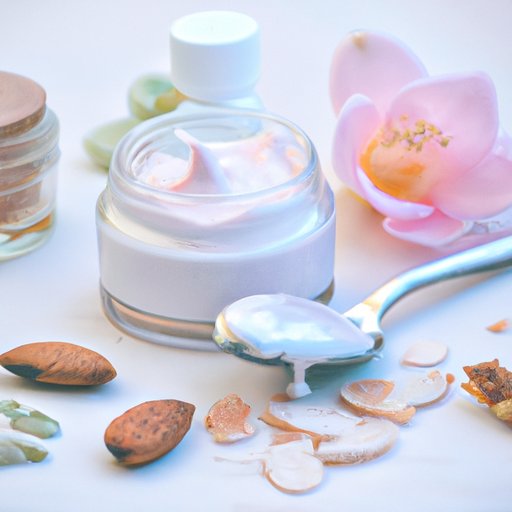
Introduction
Applying lotion on your face is a common practice. While body lotion may seem like an easy substitute for a facial moisturizer, it can do more harm than good. The frequent question remains, can one use body lotion on their face? This article explores whether you can or cannot use body lotion on your face and what factors determine and differentiate the types of moisturizers.
Compare and Contrast: Body Lotion vs. Facial Moisturizer
Body lotion and facial moisturizer may look similar, but they serve different functions. The skin on the face is more sensitive than the skin on the body. Facial moisturizer often contains emollients, humectants, and occlusives in different combinations to be more effective on the face while the body lotion is formulated to be moisturizing on rough patches on the body.
Using body lotion on the face can lead to acne breakouts, clogged pores, and irritation. This is because body lotion tends to be thicker, contains fragrances, and is oiler compared to facial moisturizers. Body lotions can clog pores, creating pimples or blackheads, which may lead to persistent blemishes, or worse, scarring. Conversely, facial moisturizers with sunscreens and potent hydration aid in preventing wrinkles, fine lines, and other signs of aging.
Skin Types and Body Lotion Use
Body lotions are formulated for a specific skin type, so their composition differs from that of facial moisturizers. It is essential to understand your skin type before settling on the suitable moisturizer.
There are four types of skin:
- Dry Skin: insufficient oil and water levels present in the skin.
- Oily Skin: characterized by excessive oil production.
- Normal Skin: balance of oil and water in the skin
- Combination Skin: the T-zone (forehead, nose, and chin) is oily, while the rest of the face is dry
It is essential to know which skin type you have before you select the correct facial moisturizer. Not following this can lead to skin irritation, dryness, or even burning. Lack of moisture can exacerbate skin sensitivities and lead to permanent damage.
Choosing the correct moisturizer for your face is crucial in keeping it looking smooth and healthy. Facial moisturizers are designed to be gentle, soothing, and provide adequate moisture. They contain ingredients such as retinol, Vitamin C, and hyaluronic acid that help keep your skin hydrated. Body lotions, on the other hand, have ingredients that work to hydrate thicker skin such as elbows or knees.
Ingredients of Body Lotion vs. Facial Moisturizer
Body lotions and facial moisturizers have different compositions since they serve different purposes. It is essential to understand the components of each product before making a choice.
Facial moisturizers have humectants and emollients that stimulate moisturization, which is vital for the face. Humectants such as glycerin, hyaluronic acid, and urea absorb moisture from the air and keep the skin looking hydrated. Emollients such as ceramides, lanolin, and shea butter make the skin soft and smooth. Most facial moisturizers also contain sunscreen to protect the face from UV rays.
Body lotions contain humectants that are not as potent, and they also have occlusive components. Occlusive ingredients such as petroleum jelly and mineral oil trap moisture in the skin leading to an oily film. Additionally, many body lotions have fragrances for that sweet-smelling scent. However, these fragrances are not the best for sensitive skin, which is typically the skin on your face.
User Experiences
When it comes to using body lotion on the face, some people vouch for it, while others do not recommend it. Ultimately the decision lies on how sensitive your skin is to the ingredients on the lotions.
Some users have reported breaking out in acne, clogged pores, or increased dryness after using body lotions. However, individuals with oily skin share that using body lotion has helped to reduce oil production on the face.
Using body lotion can cause adverse reactions to some but not to others. Still, if you have sensitive skin, it is advisable to use a product formulated for the face.
Dermatologists Advice
Dermatologists, the foremost skin experts, advise against using body lotion on the face. The ingredients in body lotions can irritate the delicate skin on the face, leading to eruptions and redness. It is recommended that one sticks to facial moisturizers, which are more gentle and have been clinically tested to be safe.
There are specific ingredients that have been tested and considered safe for sensitive skin, and dermatologists advise you stick to them. For example, niacinamide and ceramides are essential components in facial moisturizers, and one should opt for products containing them.
DIY Remedies
Individuals looking for natural alternatives can use natural oils such as jojoba, tea tree, and rose oil to moisturize the face. Natural oils penetrate the skin without leaving a greasy residue. Additionally, aloe vera gel is ideal for soothing sensitive skin and can be used as a facial moisturizer.
Alternative Uses of Body Lotion
Body lotion doesn’t have to go to waste if it’s not safe for use on the face. Body Lotion works perfectly on rough patches such as knees, elbows, and heels.
Body lotion can also be added to a bath to provide a moisturizing soak, replacing bubble bath products that can ironically deplete moisture from your skin.
Conclusion
Body lotions are ideal for the body but not for the face. Compared to facial moisturizers, body lotions are thicker and oilier in composition and contain fragrances that can be too harsh for the face. Body lotions are formulated for thicker-skin areas such as the elbows and knees.
Facial moisturizers are designed to be gentle, with soothing ingredients such as ceramides and hyaluronic acid. When selecting a moisturizer for your face, it is essential to know your skin type and ingredients that work best for your skin type. Natural oils like jojoba, rose oil, and aloe vera gel are great alternatives to commercial facial moisturizers.




